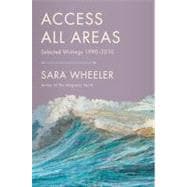
Note: Supplemental materials are not guaranteed with Rental or Used book purchases.
Purchase Benefits
Looking to rent a book? Rent Access All Areas Selected Writings 1990-2011 [ISBN: 9780865478770] for the semester, quarter, and short term or search our site for other textbooks by Wheeler, Sara. Renting a textbook can save you up to 90% from the cost of buying.
Praise for The Magnetic North
“Smashing . . . An informative and ultimately tragic tour of a region in the throes of drastic change.” —Dennis Drabelle, The Washington Post
“Exceptional . . . With wry humor and extensive research, Wheeler captures a swiftly transforming region.” —Holly Morris, The New York Times Book Review
The New copy of this book will include any supplemental materials advertised. Please check the title of the book to determine if it should include any access cards, study guides, lab manuals, CDs, etc.
The Used, Rental and eBook copies of this book are not guaranteed to include any supplemental materials. Typically, only the book itself is included. This is true even if the title states it includes any access cards, study guides, lab manuals, CDs, etc.